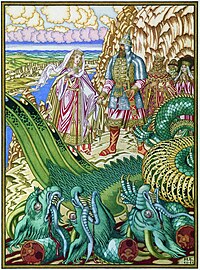
Back Портал:Фентъзи Bulgarian Wikiproyecto:Literatura fantástica Spanish Portale:Fantasy Italian Portaal:Fantasy Dutch Portal:Fantasy Polish Портал:Фэнтези Russian Портал:Фентезі Ukrainian

Selected fantasy workThe Green Child is the only completed novel by the English anarchist poet and critic Herbert Read. Written in 1934 and first published by Heinemann in 1935, the story is based on the 12th-century legend of two green children who mysteriously appeared in the English village of Woolpit, speaking an apparently unknown language. Read described the story in his English Prose Style, published in 1931, as "the norm to which all types of fantasy should conform". The novel's three parts all end with the apparent death of the story's protagonist, President Olivero, dictator of the fictional South American Republic of Roncador. In each case, Olivero's death is an allegory for his translation to a "more profound level of existence", reflecting the book's overall theme of a search for the meaning of life. Read's interest in psychoanalytic theory is evident throughout the novel, which is constructed as a "philosophic myth ... in the tradition of Plato". The story contains many autobiographical elements, and the character of Olivero owes much to Read's experiences as an officer in the British Army during the First World War. The novel was positively received, although some commentators have considered it to be "inscrutable", and one has suggested that it has been so differently and vaguely interpreted by those who have given it serious study that it may lack the form and content to justify the praise it has received. Fantasy topics
Related Portals |
